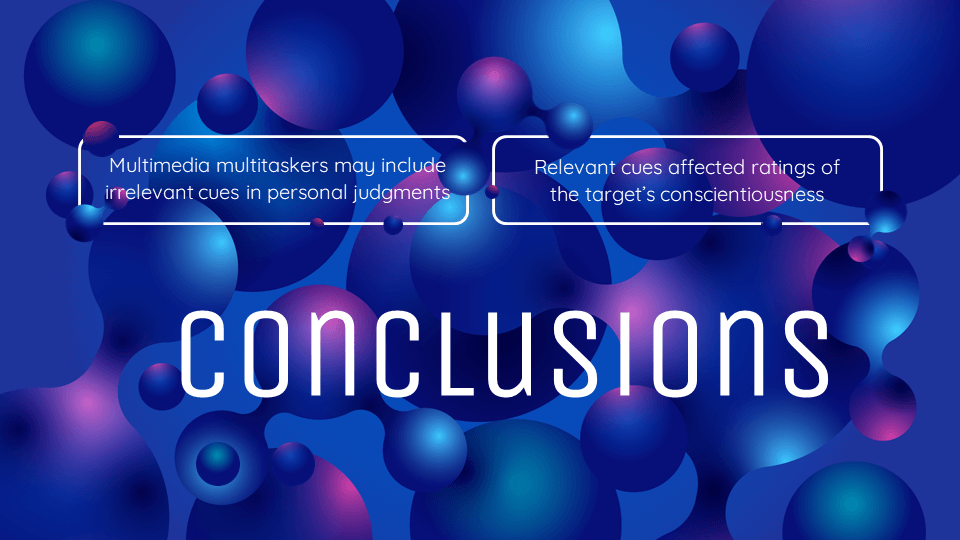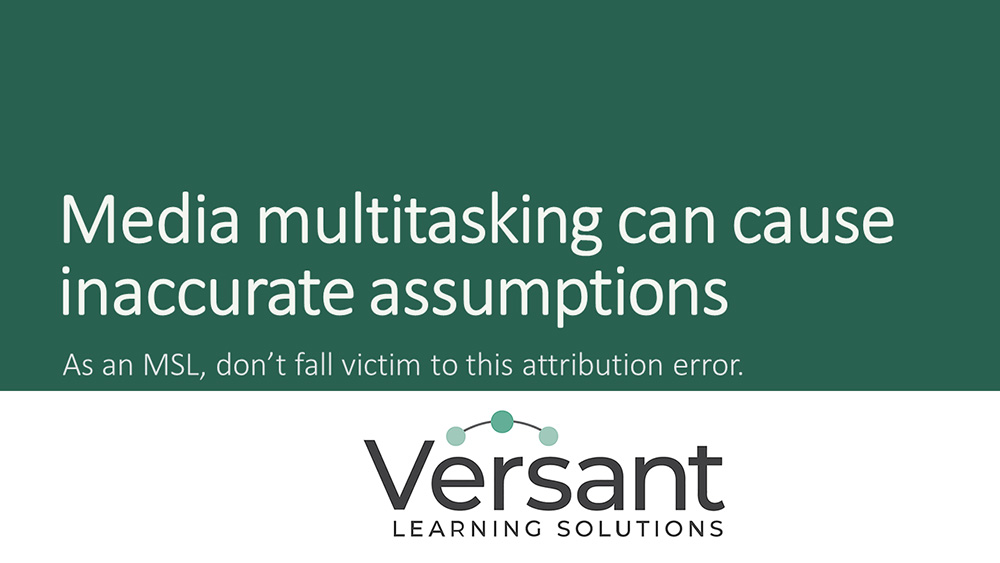Media multitasking can increase the risk that an MSL makes inaccurate assumptions.
Imagine – You are waiting for a meeting to start.
What to do? You open your tablet/smartphone or take a quick look at your smartwatch.
You are engrossed in something on social media when the provider walks in. You quickly switch on the charm.
However, could your multitasking cause you to take in inaccurate information that could bias perceptions?
Maybe.
Uh oh.

TL: DR
Suppose you are engrossed in social media when a physician walks through the door, particularly one with whom you have no prior relationship. In that case, you are likely to include irrelevant information in your assumptions about the physician. Depending on the cues, this can impair the MSL-KOL relationship from the beginning.

Media multitasking
What is media multitasking?
Besides being a mouthful, it is prevalent in everyday life.
We are media multitasking any time that we divide attention between media devices1.
Do you think you are immune? Think again.
American adults often engage in two additional media-related activities when reading, watching TV, or listening to the news. 2,3
Many Americans are online for hours each day4.

Consider this:
- Have you ever looked up a menu while people around you talk about where to go to dinner? (Hand raised.)
- Ever searched for other movies an actor plays in while watching Peaky Blinders? (my hand is up).
- Do you have three YouTube videos open as you search for information on a topic? (Yes, me too.)

Environmental Cues
If you have taken a workshop on rapport building, you know to look for environmental cues.

Are there professional photographs on the wall? Hunting trophies?
Memorabilia from a sports team? A lot of photos of the family?
Using those hints provides a means to create a connection with someone.
What if you are focusing on irrelevant cues?

Irrelevant Cues
Irrelevant cues lead to attribution errors, which is a big issue when the cue provides information about the KOL’s personality.

Let me give you an example:
You usually meet KOLs in their office, but today the KOL asks you to be brought to their Nurse Practitioner’s office. Maybe they are having their office repainted.
You are busy with multimedia while you wait for the KOL. Cat memes galore!
Consciously you are aware that this is not the KOL’s office.
Available environmental cues should not be used to make inferences about conscientiousness or personality.
Does your unconscious brain listen?

Myth of Multitasking
Your brain correctly focuses on appropriate environmental cues when you are not multitasking. In this case, when you are not multimedia multitasking.

Multitasking is a myth supported by a lot of social sciences research.
It decreases productivity and takes people out of the flow.
[There is a small percentage of “supertaskers,” but that is the subject of a different discussion.]
Why can’t we multitask?
The human brain has limited attentional resources, and cognitive overload occurs relatively easily.1

Split-second judgment
When you multitask with multimedia, irrelevant external cues compete for your attention and become part of your split-second judgment about the person you are meeting.1
When you are waiting quietly in the Nurse Practitioner’s office and are thinking through the planned meeting agenda (sans media), you are aware that this is not the KOL’s office.
The colorful afghan in the corner is not a hint about their crafting abilities. The color-coded binders lining the wall do not mean that the KOL loves organization.

That seems obvious – until your brain is processing the email pop-up and the political meme and the text message as you lift your head and make eye contact with the physician walking through the door – with the afghan in your peripheral view.

Scientific support
In 2018, researchers used the classic “Room with a Cue” set-up to examine how office and bedroom cues are used to make trait judgments about previously unknown individuals.1

Experimental Set up:
Sam is interviewed on video in a setting that is either messy or organized. The camera allows you to see Sam’s environment. The cues in the video are relevant cues to Sam’s personality.
People view the video in a setting that is either messy or organized. Researchers told participants that the regular office was not available, so researchers had to set up a secondary location. The cues in the evaluation room are irrelevant cues to Sam’s personality.
Participants are either high-level self-described multimedia multitaskers or not.

Outcomes:
So what do you think happened?
The researchers predicted that high media multitaskers would incorporate irrelevant cues into their trait judgments, but individuals that did not multitask Would ignore irrelevant cues.
Ninety-six people were tested in the experiment, and they self-identified as media multitaskers using a validated MMT-R scale.
Low or average multitaskers ignored cues in the evaluation room (all p’s ≥ 0.282.1
The researcher’s prediction was supported – High media multitaskers (+1SD; N= 14) assigned to the messy room condition gave lower conscientiousness ratings of the target than those set to view the video in the neat room,b=−4.22, SE= 1.67,t=−2.53,p= .013. 1

Conclusions
The study found people who report frequent media multitasking may include irrelevant cues during personal judgments.1

Proven Value for Medical Affairs
Your team needs to keep up to date on their soft skills training.
There is a lot of great content about multitasking and time management, and productivity available in the marketplace.
It would be difficult for anyone to keep up!
However, your Medical Affairs team has not had great experiences with workshop providers in the past.
Have you considered a workshop designed by former Medical Affairs employees designed with your team and therapeutic area and strategic concerns in mind?
It can make all the difference in the world.
Higher levels of engagement.
Easier pull-through for management.
Flexible lengths.
Versant Learning Solutions keeps up with the research and soft skill data, so you don’t have to.
We can design a workshop from the ground up or tweak a workshop to suit your needs. Your choice.
Some popular workshops now:
- Scientific Exchange in a Virtual Environment
- Running a Territory like a CEO
- Teamwork in a Hybrid Environment
- Executing in Medical Affairs
- Masterclass in Emotional Intelligence
Contact Us to Develop Your Strategy
If you would like to discuss customizing a workshop on this topic for your team, please get in touch with us.
We would love to help your team.
References
- Lopez RB, Salinger JM, Heatherton TF, Wagner DD. Media multitasking is associated with altered processing of incidental, irrelevant cues during person perception. BMC Psychology 2018;6(1). DOI: 10.1186/s40359-018-0256-x.
- Popławska A, Szumowska E, Kuś J. Why Do We Need Media Multitasking? A Self-Regulatory Perspective. Frontiers in Psychology 2021;12(269) (Hypothesis and Theory) (In English). DOI: 10.3389/fpsyg.2021.624649.
- Ran W, Yamamoto M, Xu S. Media multitasking during political news consumption: A relationship with factual and subjective political knowledge. Computers in Human Behavior 2016;56:352-359. DOI: https://doi.org/10.1016/j.chb.2015.12.015.
- Anderson M, Jiang J. Teens, Social Media and Technology 2018. Pew Research Center. May 31, 2018 (https://www.pewresearch.org/internet/2018/05/31/teens-social-media-technology-2018/).

